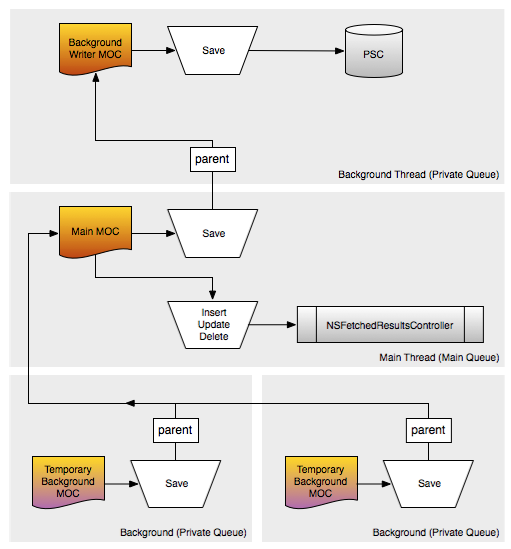Krivoblotsky / Hardcoredata
Projects that are alternatives of or similar to Hardcoredata
HardCoreData 


HardCoreData is a yet another core data stack based on Marcus Zarra's multithreading approach. This smart approach uncouples the writing into its own private queue and keeps the UI smooth as button.
HardCoreData consists of two fundamentals: HCDCoreDataStack and HCDCoreDataStackController.
HCDCoreDataStack
Incapsulates native CoreData stack setup.
/* Convenience initializers */
+ (instancetype)binaryStackWithName:(NSString *)modelName;
+ (instancetype)inMemoryStackWithName:(NSString *)modelName;
+ (instancetype)sqliteStackWithName:(NSString *)modelName;
+ (instancetype)stackWithModelName:(NSString *)modelName storeType:(NSString *)storeType;
/**
* Designated initializer
*
* @param modelName NSString
* @param storeType NSString
*
* @return HCDCoreDataStack
*/
- (instancetype)initWithModelName:(NSString *)modelName storeType:(NSString *)storeType NS_DESIGNATED_INITIALIZER;
HCDCoreDataStack protocol
Since HCDCoreDataStack is a protocol as well as a class, you can create your own custom stacks, by implementing protocol.
@protocol HCDCoreDataStack <NSObject>
@required
/* Represents current store coordinator */
@property (nonatomic, strong, readonly) NSPersistentStoreCoordinator *persistentStoreCoordinator;
/* Represents currentm object model */
@property (nonatomic, strong, readonly) NSManagedObjectModel *managedObjectModel;
/* Represents your single source of truth. Associated with main queue. */
@property (nonatomic, strong, readonly) NSManagedObjectContext *mainManagedObjectContext;
@end
HCDCoreDataStackController
The controller to instantiate child MOCs and save the while chain to the persistent store.
/**
* Designated initializer
*
* @param stack HCDCoreDataStack
*
* @return HCDCoreDataStackController
*/
- (instancetype)initWithStack:(id <HCDCoreDataStack>)stack NS_DESIGNATED_INITIALIZER;
/**
* Instantiates new child context with given concurrency type.
* You are responsive for retaining.
*/
- (NSManagedObjectContext *)createChildContextWithType:(NSManagedObjectContextConcurrencyType)type;
/**
* Saves the main context and pushes changes to the store.
* Its thread-safe to call it.
*/
- (void)save;
The whole pattern
/* Create core data stack */
HCDCoreDataStack *stack = [HCDCoreDataStack sqliteStackWithName:@"Model"];
HCDCoreDataStackController *coreDataController = [HCDCoreDataStackController controllerWithStack:stack];
NSManagedObjectContext *backgroundContext = [coreDataController createChildContextWithType:NSPrivateQueueConcurrencyType];
[backgroundContext performBlock:^{
Person *person = [NSEntityDescription insertNewObjectForEntityForName:NSStringFromClass([Person class]) inManagedObjectContext:backgroundContext];
person.firstName = @"John";
person.lastName = @"Doe";
/* Save child context */
[backgroundContext save:nil];
/* Save data to store */
[coreDataController save];
}];
Checkout Example folder for complete example.
Usage
To run the example project, clone the repo, and run pod install from the Example directory first.
Installation
HardCoreData is available through CocoaPods. To install it, simply add the following line to your Podfile:
pod "HardCoreData"
Author
Serg Krivoblotsky, [email protected]
History
See Releases
License
HardCoreData is available under the MIT license.
Copyright (c) 2015 Serg Krivoblotsky <[email protected]>
Permission is hereby granted, free of charge, to any person obtaining a copy
of this software and associated documentation files (the "Software"), to deal
in the Software without restriction, including without limitation the rights
to use, copy, modify, merge, publish, distribute, sublicense, and/or sell
copies of the Software, and to permit persons to whom the Software is
furnished to do so, subject to the following conditions:
The above copyright notice and this permission notice shall be included in
all copies or substantial portions of the Software.
THE SOFTWARE IS PROVIDED "AS IS", WITHOUT WARRANTY OF ANY KIND, EXPRESS OR
IMPLIED, INCLUDING BUT NOT LIMITED TO THE WARRANTIES OF MERCHANTABILITY,
FITNESS FOR A PARTICULAR PURPOSE AND NONINFRINGEMENT. IN NO EVENT SHALL THE
AUTHORS OR COPYRIGHT HOLDERS BE LIABLE FOR ANY CLAIM, DAMAGES OR OTHER
LIABILITY, WHETHER IN AN ACTION OF CONTRACT, TORT OR OTHERWISE, ARISING FROM,
OUT OF OR IN CONNECTION WITH THE SOFTWARE OR THE USE OR OTHER DEALINGS IN
THE SOFTWARE.


